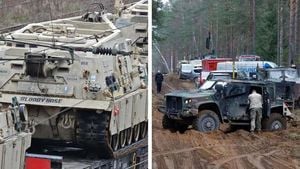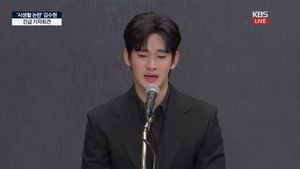Christoph Heusgen, emotional yet proud, bid farewell to his role as chairman of the Munich Security Conference (MSC) during its 61st iteration, closing the event at the Bayerischer Hof hotel on February 16, 2025. His address not only capped off three years of leadership but also highlighted the growing geopolitical challenges facing Europe, particularly the rising tensions between the U.S. and its old allies.
Heusgen, known for his long-term advisory role under former Chancellor Angela Merkel, expressed gratitude to European leaders for their cooperation. Notably, he thanked Ukrainian President Volodymyr Zelensky for vocally challenging U.S. Vice President JD Vance’s remarks made during the conference. Heusgen stated, "With (convenor of the MCU) Ewald von Kleist this conference started as a trans-Atlantic conference after the speech of Vice President Vance on Friday we have to fear our common value base is not common anymore." This highlight underscored the growing assertiveness and concern among European leaders who are worried about the deteriorations of shared values and democratic principles.
The remarks from Vice President Vance stirred significant reaction, with critics, including German Chancellor Olaf Scholz, arguing against the perceived notion of European democracy being under threat. Vance accused Europe of suppressing free speech and undermining democracy, prompting pushback from several leaders during the MSC.
During the closing remarks, Heusgen displayed visible emotion as he handed over the reins to former NATO Secretary General Jens Stoltenberg, who remarked, "He made the key international conference stronger, broader and on the right track." Stoltenberg, set to take over the full-time organization of the MSC after serving as Norway's finance minister, conveyed the responsibility he was assuming, especially as the next conference is set for February 2026.
This leadership transition highlights the shifting dynamics of international relations and the underlying fears following Russia’s invasion of Ukraine and the curtailing of freedoms within Europe. With Heusgen stepping down and Stoltenberg stepping up, many are left to ponder how the MSC will adapt to the changing global environment.
Throughout Heusgen's tenure, the MSC saw the incorporation of various topics central to the discourse of security and democracy across Europe and beyond. His efforts have fused international cooperation and have aimed to create stronger alliances, especially within the NATO framework. Stoltenberg’s assumption of leadership brings with it the expectation of continuity, though the challenges remain considerable.
Following the heated discussions surrounding Vice President Vance’s speech, Heusgen's farewell echoed the sentiments of many who rallied behind the need for unity and common goals, especially amid troubling global tensions. Zelensky’s vocal support was noted as emblematic of Ukraine's relationship with not only the U.S. but also its European allies, which have been strained at times.
Stoltenberg’s upcoming leadership will undoubtedly come under scrutiny as many anticipate his approach to steering discussions at the MSC, especially on issues such as European defense, democracy, and the coordination among trans-Atlantic partners. He faces the monumental task of ensuring the MSC remains relevant and effective—a true backbone for international security discourse.
The growing climate of distrust and division, as illustrated by the reactions to Vance's statements, will challenge Stoltenberg from day one. Conference debates are likely to navigate pressing issues such as foreign policy, global security threats, and the imperative for democratic solidarity among nations.
The Munich Security Conference has long been a pivotal platform for international dialogue, and the seismic leadership shift presents both opportunities and hurdles. Observers will be watching closely to see how Stoltenberg shapes his vision for the conference and how he intends to carry forward Heusgen's legacy.
With turbulent times expected to remain prevalent, the stakes are high for Stoltenberg and the MSC as they prepare for future discussions. The adaptability and strength of international alliances could very well depend on this leadership change and the visionary strategies Stoltenberg may implement to address complex security concerns.



